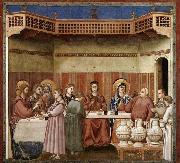Wholesale Oil Painting No Minimum |
|||||||||||
|
|
|||||||||||

|
|||||||||||
|
|
|
||||||||
GIUSTO de MenabuoiItalian painter, Florentine school (b. ca. 1320, Firenze, d. 1391, Italian painter, Florentine school (b. ca. 1320, Firenze, d. 1391, was an Italian painter of the early Renaissance. He was born in Florence. In Lombardy he executed a fresco of the Last Judgement in the Abbey of Viboldone, Milan. He then moved to Padua where he completed frescos in the Church of the Eremitani, the Basilica of Saint Anthony of Padua and most notably, the Baptistery of the Duomo (1376). |
||||||||
|
|
||||||||
Marriage at Cana
Marriage at Cana Painting ID:: 43838 |
1376-78 1376-78 |
|||||||
|
|
||||||||
GIOTTO di BondoneItalian Early Renaissance Painter, 1267-1337 Italian painter and designer. In his own time and place he had an unrivalled reputation as the best painter and as an innovator, superior to all his predecessors, and he became the first post-Classical artist whose fame extended beyond his lifetime and native city. This was partly the consequence of the rich literary culture of two of the cities where he worked, Padua and Florence. Writing on art in Florence was pioneered by gifted authors and, although not quite art criticism, it involved the comparison of local artists in terms of quality. The most famous single appreciation is found in Dante's verses (Purgatory x) of 1315 or earlier. Exemplifying the transience of fame, first with poets and manuscript illuminators, Dante then remarked that the fame of Cimabue, who had supposed himself to be the leader in painting, had now been displaced by Giotto. Ironically, this text was one factor that forestalled the similar eclipse of Giotto's fame, which was clearly implied by the poet. |
||||||||
|
|
||||||||
|
|
Marriage at Cana
Marriage at Cana Painting ID:: 62988 |
1304-06 Fresco, 200 x 185 cm Cappella Scrovegni (Arena Chapel), Padua The comic characterization of the guests and servants is noteworthy in this scene. Artist: GIOTTO di Bondone Painting Title: No. 24 Scenes from the Life of Christ: 8. Marriage at Cana , 1301-1350 Painting Style: Italian , , religious 1304-06 Fresco, 200 x 185 cm Cappella Scrovegni (Arena Chapel), Padua The comic characterization of the guests and servants is noteworthy in this scene. Artist: GIOTTO di Bondone Painting Title: No. 24 Scenes from the Life of Christ: 8. Marriage at Cana , 1301-1350 Painting Style: Italian , , religious |
||||||
|
|
||||||||
|
GIOTTO di Bondone Italian Early Renaissance Painter, 1267-1337 Italian painter and designer. In his own time and place he had an unrivalled reputation as the best painter and as an innovator, superior to all his predecessors, and he became the first post-Classical artist whose fame extended beyond his lifetime and native city. This was partly the consequence of the rich literary culture of two of the cities where he worked, Padua and Florence. Writing on art in Florence was pioneered by gifted authors and, although not quite art criticism, it involved the comparison of local artists in terms of quality. The most famous single appreciation is found in Dante's verses (Purgatory x) of 1315 or earlier. Exemplifying the transience of fame, first with poets and manuscript illuminators, Dante then remarked that the fame of Cimabue, who had supposed himself to be the leader in painting, had now been displaced by Giotto. Ironically, this text was one factor that forestalled the similar eclipse of Giotto's fame, which was clearly implied by the poet. Marriage at Cana 1304-06 Fresco, 200 x 185 cm Cappella Scrovegni (Arena Chapel), Padua The comic characterization of the guests and servants is noteworthy in this scene. Artist: GIOTTO di Bondone Painting Title: No. 24 Scenes from the Life of Christ: 8. Marriage at Cana , 1301-1350 Painting Style: Italian , , religious |
||||||||
|
|
||||||||
|
Prev Next
|
||||||||
|
|
||||||||
|
Related Paintings to GIOTTO di Bondone :. |
||||||||
|
|
||||||||
|
CONTACT US |


